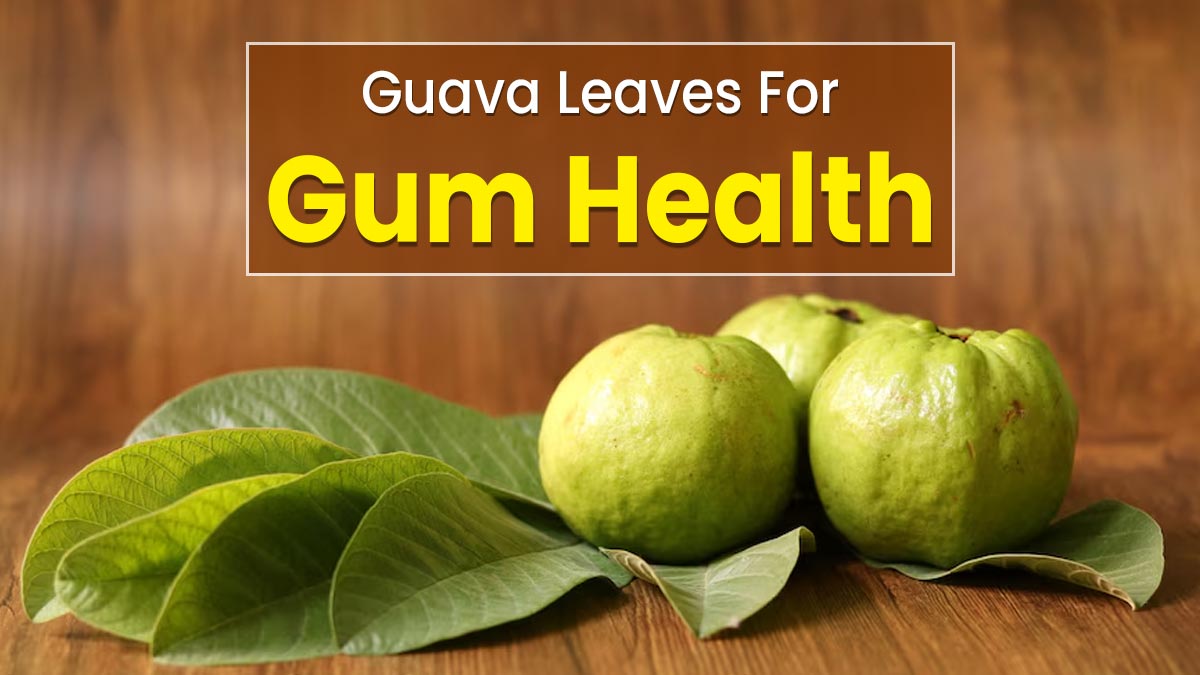
Guavas are known for their rich nutritional value and a plethora of health benefits. However, did you know its leaves also have several benefits, including promoting your gum health? Their antioxidant, anti-inflammatory, antimicrobial, and healing properties make them a valuable natural remedy against gum diseases like gingivitis and periodontitis. In this article, we list the benefits of guava leaves for gum health and ways to use them.
Table of Content:-

Gums, or gingiva, play a crucial role in oral hygiene. They protect the roots of teeth, hold them in place, and provide a barrier against bacteria that can cause infections and diseases like gingivitis and periodontitis. According to BMC Oral Health, periodontal disease can greatly impact quality of life, with more severe and widespread cases causing greater disruption. It can lead to physical discomfort, psychological distress, social limitations, and physical disability, along with pain and restricted functionality.
Benefits Of Guava Leaves for Gum Health

Antioxidant Properties
Guava leaves contain antioxidants like flavonoids and polyphenols that fight oxidative stress. This oxidative stress can harm gum tissue, causing inflammation and potentially leading to gum disease. The antioxidants in guava leaves help protect gums by neutralising free radicals, keeping them healthy and strong.
Anti-inflammatory Effects
Did you know Inflammation is a common precursor to gum disease? Guava leaves contain compounds like quercetin and guaijaverin, known for their anti-inflammatory properties. These compounds help reduce swelling, redness, and discomfort in the gums, promoting overall gum health.
Also Read: Oral Care: Expert Explains Crucial Role Of Regular Dental Checkups In Preserving Oral Health

Antimicrobial Action
One of the most significant benefits of guava leaves for gum health is their antimicrobial action. They contain antibacterial agents that naturally hinder the growth of harmful bacteria in the mouth. This quality not only helps prevent plaque buildup but also lowers the chances of infections that may cause gum disease.
Healing Properties
Guava leaves are also well known for their healing abilities. When chewed or used in mouthwash form, they can soothe irritated gums, alleviate pain, and aid in the healing of minor oral wounds. This makes them a valuable natural remedy for maintaining oral hygiene.
How to Use Guava Leaves for Gum Health

Chewing Fresh Leaves
One of the simplest ways to reap the benefits of guava leaves is by chewing fresh leaves. Rinse them thoroughly, chew them for a few minutes, and then discard them. This method allows the beneficial compounds to directly interact with the gums and teeth.
Guava Leaf Mouthwash
You can prepare a guava leaf mouthwash by boiling several leaves in water until the water turns brownish. Allow it to cool, strain the leaves, and use the liquid as a mouthwash. Gargle with this solution after brushing your teeth to benefit from its antimicrobial and healing properties.
A study conducted in 2019 found that using guava leaf mouthwash is an effective, non-pharmacological, affordable, and convenient way to tackle oral health problems.
Also Read: Detox Your Mouth: Try These DIY Mouthwashes To Revitalise Your Oral Health
Guava Leaf Extract
Guava leaf extract is available in various forms, including oral rinses and toothpaste. These products are formulated to harness the beneficial properties of guava leaves effectively. Incorporate them into your daily oral care routine to promote gum health.
Precautions and Considerations
While guava leaves are generally safe for oral use, some people may experience mild allergic reactions. It's advisable to test for any sensitivity by applying a small amount of guava leaf extract to the skin before using it orally. Also, consult with a healthcare professional, especially if you have pre-existing oral health conditions or allergies.
[Disclaimer: This article contains information for informational purposes only, hence, we advise you to consult your own professional if you are dealing with any health issues to avoid complications.]
Also watch this video
How we keep this article up to date:
We work with experts and keep a close eye on the latest in health and wellness. Whenever there is a new research or helpful information, we update our articles with accurate and useful advice.
Current Version
